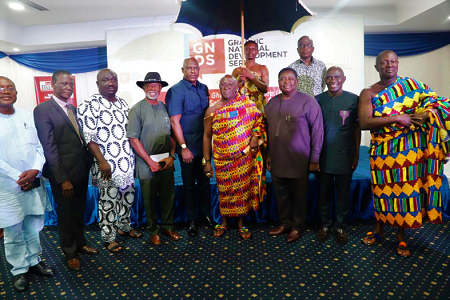
At Graphic National Development Series: Give ear to agric experts - Asantehene to govt
The Asantehene, Otumfuo Osei Tutu II, has urged the government to listen to knowledgeable voices on agriculture, instead of dismissing them as mere criticism.
He said turning around the country's agricultural sector to meet the food needs of the people required pieces of advice and suggestions from experts in the sector.
In a speech read on his behalf by the Asafohene, Akyamfour Asafo Boakye Agyemang-Bonsu, at the first Graphic National Development Series (GNDS) dialogue in Kumasi yesterday, the Asantehene said such suggestions from experts should not be misconstrued as criticisms or opposition views but rather as the experts’ contributions to better the sector for the benefit of all.
He said with an agrarian economy, the country should not be importing food such as rice and tomato to feed its people and stifle the country of the needed foreign exchange.
He said Ghana had the potential to be a net exporter of food and consequently urged the government to ensure that agriculture, “which is the mainstay of our economy, stands out”.
Dialogue
The dialogue, which was on the theme: "Transforming Ghana’s agriculture using homegrown solutions for food security”, discussed development issues, particularly agriculture, without a partisan stance or undertone.
The GNDS is an initiative of the Graphic Communications Group Limited (GCGL) aimed at diagnosing and finding solutions to some of the major socio-economic issues confronting the country.
Held in partnership with the state broadcaster, the Ghana Broadcasting Corporation, the dialogue has been instituted as an annual feature on the calendar of the company and will be held during the month of Independence celebration.
High import
The Asantehene said there was the need for Ghana to reverse the importation of food in order to reduce the high import bill and pressure on the demand for foreign exchange.
He said the impact of the Russia-Ukraine war on global food supplies was enough lesson to “wake us up as a country to put our agriculture in order”.
Furthermore, he said it was unacceptable for the country to struggle with food security when “we have such vast arable lands, with all intellectual capacity in agriculture and adequate hands for farming”.
“But the hard truth is that this is our reality and this is why we are gathered here,” he added.
Graphic commended
Otumfuo Osei Tutu commended the GCGL for organising the dialogue, which he said provided the platform to steer discussions on national issues away from the usual national politics and name-calling.
“In my opinion, this reaffirms the reputation of the GCGL as a publisher whose aim is to pursue the national agenda without stirring national division,” he said.
He said data available indicated that the country imported about 70 per cent of its rice needs annually, noting that that could serve as an opportunity for investment in the sector.
Illegal mining
The Asantehene indicated that the nation’s inability to produce enough food to meet the national demand had been compounded by the menace of illegal mining, which had destroyed all the fertile lands.
“Fertile lands in our forest reserves are under severe attack for minerals in ways that are not environmentally friendly.
“This has led to loss of cultivable land, and if this is not checked with all the seriousness it deserves, we may wake up one day and realise that our rainforest is totally destroyed,” he added.
Spatial planning
Otumfuo Osei Tutu called for a second look to be taken at the spatial planning of the assemblies to create farmlands within the cities and encourage urban farming.
He said people should be able to farm in their backyards and grow vegetables.
In his welcome address, the Managing Director of the GCGL, Ato Afful, said the GNDS was an initiative to promote “journalism that explains the news better, gives people hope and points to the solution rather than just identifying problems”.
The maiden edition, he said, was to promote agriculture and agro-processing and help bring the nation's mind to work to achieve food sustainability and security in Ghana.
Food security
Mr Afful said there must be reliable and abundant supply of made-in-Ghana foods that would nourish the growing young population “and further processed into value for our shelves”.
“I am convinced that when our capable young and hardworking people are trained and tooled to work and technologically enabled, we will be well fed and watered and the noise will cease,” he said.
Consequently, he said, the country's energies should be meaningfully channelled into building a thriving economy and society rich with ideas and opportunities that knew no bounds.
“There is nothing like dreaming to create the future without commitment and consistent work. We want to make connections to take action using agriculture as a classic income multiplier to food security, job creation and a pathway to a reduction in poverty,” he said.
Motivation
An agricultural policy advisor, Abraham Dwuma Odoom, said it was possible for the country to produce enough food to meet national needs, just as Nigeria was able to revolutionise its rice sector.
Mr Odoom, who is a former Member of Parliament for Twifo-Atti-Morkwa, said all that farmers needed were motivation and the needed support.
“If these are provided, farmers should be able to produce to feed the country and also make money out of their toil,” he added.
